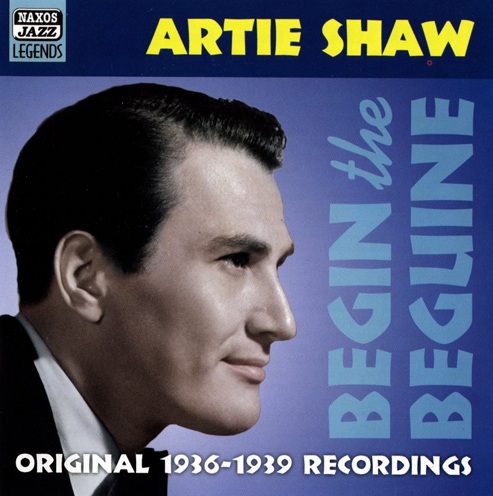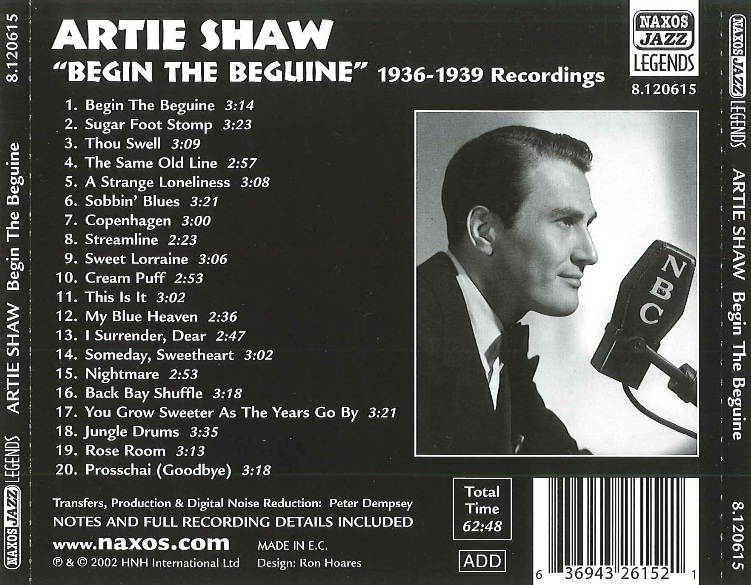Logowanie
Dziś nikt już tak genialnie nie jazzuje!
Bobby Hutcherson, Joe Sample
San Francisco
SHM-CD/SACD - NOWY FORMAT - DŻWIĘK TAK CZYSTY, JAK Z CZASU WIELKIEGO WYBUCHU!
Wayne Shorter, Freddie Hubbard, Herbie Hancock, Ron Carter, Elvin Jones
Speak no evil
UHQCD - dotknij Oryginału - MQA (Master Quality Authenticated)
Chesky! Niezmiennie perfekcyjny
Winylowy niezbędnik
ClearAudio
Double Matrix Professional - Sonic
najbardziej inteligentna i skuteczna pralka do płyt winylowych wszelkiego typu - całkowicie automatyczna
Artie Shaw
Begin The Beguine

- Artie Shaw - clarinet
Original 1936 - 1939 Recordings
ARTIE SHAW ‘Begin the Beguine’ Original Recordings 1936-1939 "When Benny Goodman was the self-appointed ‘King of Swing’, Shaw was ‘The King of the Clarinet’. Each was a brilliant practitioner, a creative musician and a leader in his own right but diametrically opposed to the other in character, with a media-manipulated professional rivalry as their only apparent common denominator. "Charismatic and chameleon-like" and also gifted with screen-idol looks, composer-arranger Artie Shaw was born Arthur Jacob Arshawsky in New York City on 23rd May, 1910, and from the age of seven grew up in New Haven, Connecticut. The first instrument he mastered was the ukelele but by twelve he had already switched to the saxophone which he played in the school band at New Haven High. After winning a local competition in duo with banjoist Gene Beecher he formed his first band, the Bellevue Ramblers, and with them played local gigs until, at fifteen, he got his first fully professional job in the pit orchestra of the New Haven Olympic Theater. Shortly after this he left home to join a Kentucky travelling band and by the summer of 1925 he had joined Don ‘Johnny’ Cavallaro’s ranks as an alto-saxophonist for a tour of New Haven and Florida, before working with Joe Cantor and Merle Jacobs in Cleveland, Ohio. Between 1927 and 1929 Artie was intermittently arranger-MD and lead-alto sideman in the band fronted by violinist Austin Wylie and by mid-1928 he had joined Irving Aaronson’s Commanders, doubling on tenor and clarinet. At Pod’s & Jerry’s he reputedly jammed frequently after hours with Willie ‘The Lion’ Smith, but began his regular New York career as a session player for Roger Wolfe Kahn, Vincent Lopez, Paul Specht and others and as a sideman on records with Fred Rich and Teddy Wilson. In 1931 he played a season with Red Nichols at the Park Central Hotel and for a time worked as an NBC radio session musician. In May 1936 he led a band in New York’s first Swing concert at the Imperial Theater; featuring a small string section, this proved popular and secured him the finance necessary to form his string-preponderant first big-band. This recorded for Brunswick from June 1936. (Tracks 2-4, 6-10, 12 — in Streamline and Sweet Lorraine Artie’s solo clarinet is superimposed over three violins, viola and ’cello). While no innovation as such (the use of strings in a jazz context harked back to Paul Whiteman and also anticipated Glenn Miller) the overall effect was pleasant and deserving of more lasting recognition. But alas, this was the Swing Era fully-fledged and sweet though his arrangements were (the record reviewers certainly were impressed with his first efforts, although Shaw himself professed to find them disappointing, pale replicas), the more sales-conscious studio boffins complained that his outfit didn’t really swing and, by May 1937 while resident at Boston Roseland-State Ballroom, Artie had needed to alter his formula. Resolving to give his critics "the loudest goddam band in the world", in ‘His New Music’ he reverted to a more conventional 14-piece and, as we hear in I Surrender, Dear and Someday, Sweetheart, greater emphasis was placed on the rhythm section (featuring first Cliff Leeman then variously Buddy Rich and George Wettling) and Artie’s technically flawless and superlatively fluid improvisations, made more prominent by the deft arranging of Jerry Gray. Shaw had previously had hits in the US Top 30 pop charts (the first in December 1936, plus seven more, including two in the Top 10, during 1937 and 1938) and in June 1938 Down Beat magazine rave-reviewed his band as "the biggest hunk of dynamite now languishing in the shade of the old one-night stand". Certainly, when the band had transferred to Victor’s more prestigious Bluebird label — or more accurately, when their first recorded side Begin The Beguine became their first No.1 (in September) — the handsome, debonair Shaw became an instant celebrity, foremost among America’s hottest swing commodities, Goodman notwithstanding. This record, the first made of the hit-song from Cole Porter’s 1935 show Jubilee, was voted (in a Billboard Disc jockey poll) No.3 all-time best record and No.5 all-time best song. Featuring Artie’s most famous solo, it became his first Golden Disc, selling a million copies by 1944. Further hits followed in steady succession, including "I Poured My Heart Into A Song" and "Comes Love" (both at No.4) "Deep In A Dream" (No.3), "They Say" and "Thanks For Everything" (both No.1s), Ernesto Lecuona’s Jungle Drums (this Latin number charted at No.15 in February 1939) and You Grow Sweeter As The Years Go By (No.15, May 1939), plus Shaw’s own compositions Nightmare (a November 1938 US No.7 and his second Golden Disc, this sold a million by 1943) and Back Bay Shuffle (written in collaboration with Teddy McRae, this September 1938 No.8 became his third million-seller by 1950). Artie’s first big band was disbanded in November, 1939. Peter Dempsey, 2002 The Naxos Historical labels aim to make available the greatest recordings of the history of recorded music, in the best and truest sound that contemporary technology can provide. To achieve this aim, Naxos has engaged a number of respected restorers who have the dedication, skill and experience to produce restorations that have set new standards in the field of historical recordings. Peter Dempsey A tenor singer of wide range and performing experience, Peter Dempsey specialises in Victorian and Edwardian genre ballads and art-song, and has recorded various CDs, including Love’s Garden Of Roses for Moidart. Quite apart from his personal enthusiasm for music in the broadest sense, through his assiduous collecting and study of 78s over many years, Peter has acquired not only a wide knowledge of recorded musical performance but also a heartfelt awareness of the need to conserve so many "great masters" who — were it not for CD — might now be lost for future generations. A recognised authority on old recordings, Peter now regularly researches and produces CD albums from 78s."































